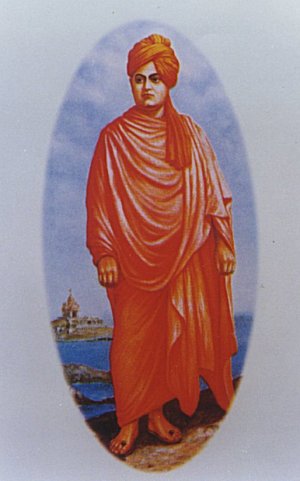Music - Highest Form of Worship
Swami Vivekananda in a Beam of Musical Light
by Prakash G. Burde
First Online: February 03, 2008
Page Last Updated: December 07, 2024
While researching for an article on Pandit Ramkrishnabua Vaze (1858-1943) — one of the foremost Hindustani vocalists belonging to the Gwalior Parampara, I stumbled upon a fascinating piece of historical information about Swami Vivekananda, which was either hither to unknown or simply ignored. I want to share this with the net surfers, particularly the readers of Kamat's Potpourri, as I consider the musical side of Swami Vivekananda (also known as Narendra Nath Dutt) in his short yet eventful life, very unique. For Swami Vivekananda, music "is the highest form of art and those who understand it, is the highest form of worship (for them)" (collected works V-125)
Narendra Nath inherited love of music from his parents. While his father Vishwanath Dutt taught him rudiments of Dhrupad and Dhamar — the raga music of ancient India, while his mother Bhuvaneshwari Devi, taught him the music of lighter genre such as "Krishna-Leela" depicting the pranks of Krishna - the toddler. Swamiji's contemporaries, Swami Abhedanand and Shyamanand mention that Narendra Nath also had intense training from Beni Gupta, Ahmed Khan, and Chhote and Bade Dunni Khan. He also learnt to play the Pakhawaj, an ancient Indian drum held horizontally and played with fingers, while squatting on the floor. Before he turned twenty, Narendra Nath was an accomplished singer in Dhrupad and a much sought-after Pakhawaj player. He participated in several concerts in Kolkata, then known as Calcutta.
K.L. Kamat/Kamat's Potpourri
The Hindu Monk from India
Painting of Swami Vivekananda from a calendar painting
It should not surprise many that Vivekananda besides being an excellent orator, was well versed in theatre as well. He acted as Abhedanand in Trilok Nath Sanyal's musical play "Nav-Vrindavan" and donned saffron robes. Perhaps it was ordained by providence as proved later that Sri Ramakrishna Paramahansa, who witnessed this show was to be his mentor and saffron robes and asceticism became a way of life for Narendra Nath Dutt.
There were two localities in Calcutta, which were truly famous as centers of east-west cultures. One was known as Duttapara where Narendra Nath Dutt lived; and a few furlongs away was Tagorepara, where Rabindra Nath Tagore lived. Many of Rabindra Nath's songs like "Gaganer Thale" in Raga Jaijaiwanti, a night melody, were musically set to tune by Narendra Nath, and his rendition of this composition made it sublime and ethereal. Rabindra Nath Tagore, himself a great composer, was later to become a precursor of the new "Rabindra Sangeet" - an amalgam of music of east and west and also of Carnatic music popular in Southern India. All this without naming Rabindra Sangeet as 'fusion music' which is ever so popular today! This new system of music created by Tagore is recognized by the All India Radio as light music.
Ramkrishnabua Vaze (1858-1943) mentions about his visit to Swami Vivekananda's Bareilly Ashrama on his return trip from Nepal. Vaze was a guest of Swamiji and both of them indulged in vocal music every evening much to the delight of local connoisseurs. "... Swamiji would get up early in the morning, tune his two Tanpuras (Indian drones) and sing a morning melody Ahir Bhairav, specifically a Tansen Dhrupad composition, to wake up the Ashramites. The days I spent in the Ashram were simply unforgettable" Vaze remembers (Sangeet Kala Prakash II).
Besides being one of the foremost spiritual teachers, Vivekananda made a profound and everlasting contribution to the revival of Hinduism devoted to the social development of the downtrodden. But at the same time it is regrettable to note that his other great gift, that of musicianship, was totally ignored by his followers. He wrote a book on Indian music "Sangeet Kalpataru" while he was barely twenty! While the first edition bore his name as the author, the later editions published by the same publisher Baishnav Charan Basak quietly dropped the author's name (Narendra Nath Dutt) perhaps under compulsion and changed the title to "Sachitra Vishwa Sangeet" edited by the publisher himself!
![]()
References
- Sangeet Kala Prakash Part I & II by Pandit Ramkrishnadua Vaze
- Swami Vivekanand - a P.T I Publication by Pandit Madanlal Vyas musicologist and translator of Bengali musical books in Hindi
![]()
See Also:
- Indian Music -- Miscellaneous topics on Indian music explore musical instruments, styles, musicians, and other Indian musical trivia
- Sonar Bangla -- Kamat's controversial travelogue of West-Bengal; pictures, cartoons, letters and interviews.

